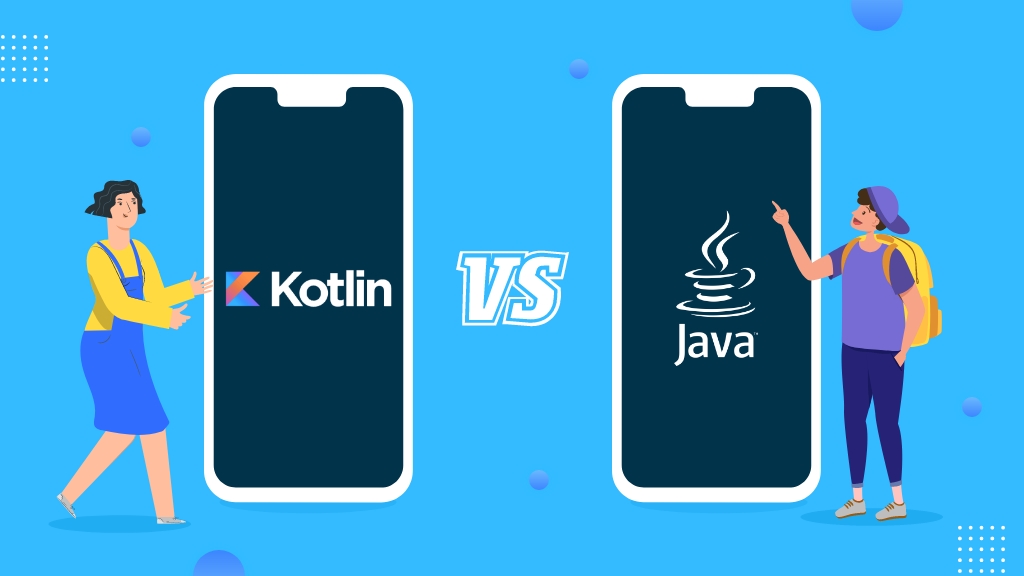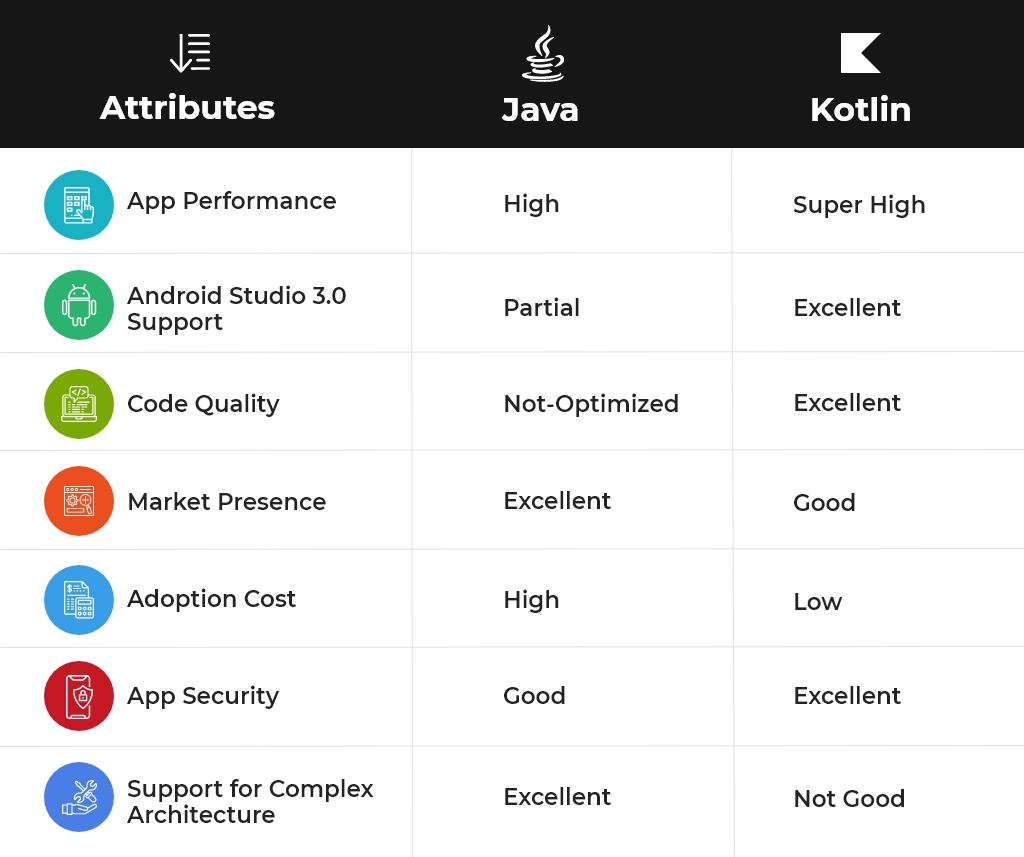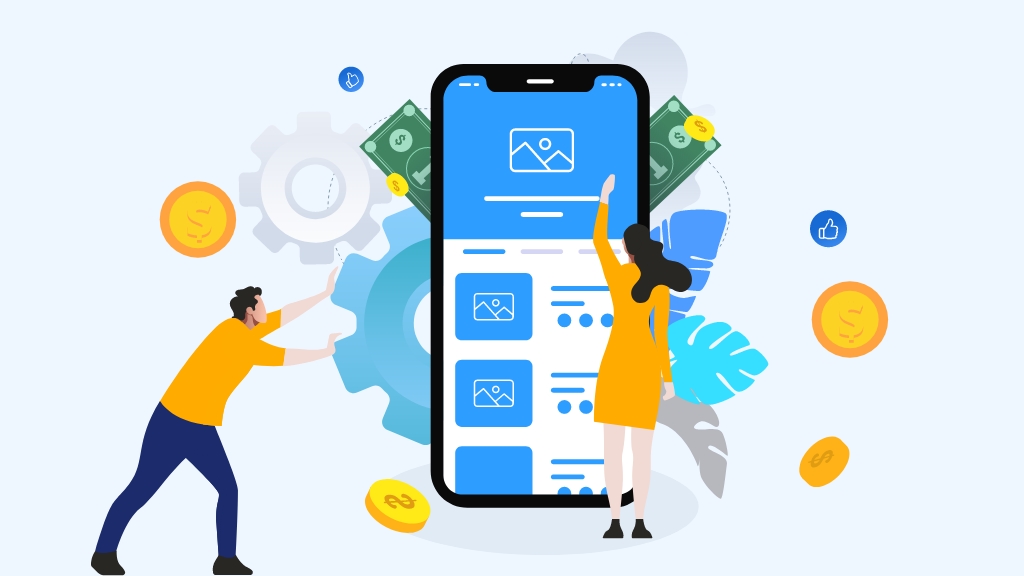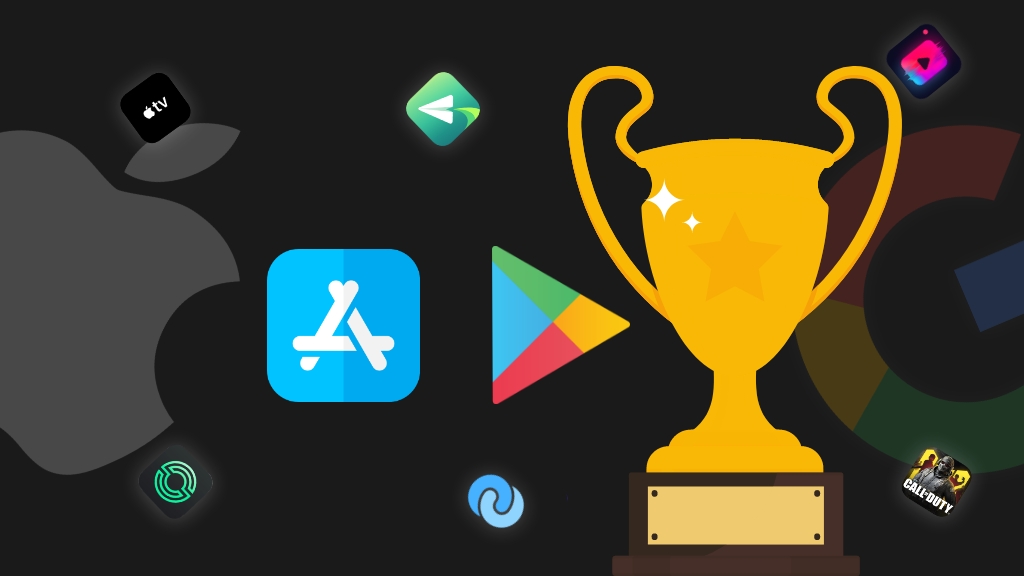Don't miss the chance to work with top 1% of developers.
Sign Up Now and Get FREE CTO-level Consultation.
Confused about your business model?
Request a FREE Business Plan.
Kotlin vs Java: Which is Best For Developing Your Business Mobile App in 2020?
Table of contents

When it comes to developing a business mobile app, Android is the preferred platform for a number of entrepreneurs because of the amazing benefits it offers. Low investment, high ROI, a huge user base and faster deployment time are some of the benefits that this platform offers.
And because of the positive impact of developing for Android on the growth of businesses, a number of budding entrepreneurs are planning to develop an Android app equipped with emerging technologies that provide an amazing user experience.
However, which programming language one should use while developing an Android app is still a mystery. Mainly, there are two programming languages that are used for developing an Android App – Java and Kotlin.
While Kotlin was released by Jetbrain in the year 2011, Java is an old player in the fields of Android. The Kotlin vs Java battle commenced when Kotlin got traction among developers in the past few years after Google announced it as the official language for android app development. But, can it fully replace Java in the near future is yet to be seen.
But, right now, the concern is which Programming Language you should choose for developing your business app? To find an answer to this question, let’s get familiar with both the players first.
What Is Java?
Java is a general-purpose PL that follows OOP (object-oriented programming) and Write Once Run Anywhere rule. Java is utilized for creating desktop, web, enterprise and mobile applications. It isn’t just a language, however, an ecosystem of tools covering nearly all that you may require for Java development – Java Development Kit, Java Runtime Environment and Integrated Development Environment.
Java can be found anywhere you look. It’s the main language for Android development but you will find its use in web apps, governmental apps and big data technologies like Apache Storm and Hadoop. It can likewise be utilized for high-end projects that involve emerging technologies like natural language processing, machine learning, and AI.
Advantages of Java
- It can be understood easily
- It can run on a virtual machine or browser window, which comes handy while reusing a code
- It is amazing for cross-platform apps
- Android SDK complements Java with numerous standard Java libraries
- It is a broad open-source ecosystem; on account of Google’s adoption of the JVM or Java Virtual Machine.
Disadvantages of Java
- Its limitations can cause errors with the Android API design.
- Because of more code lines in Java, the chances of bugs and errors increase significantly.
- Compared to other programming languages, Java is a bit slow and needs a ton of memory.
What Is Kotlin?
Kotlin is a programming language for the JVM (Java Virtual Machine) and can, thus, be utilized anywhere Java is utilized today. This includes client, server, web, and android development. It’s created by JetBrains who is presently trying to bring Kotlin to embedded frameworks and iOS too, possibly making it a one-stop language for all application areas.
What makes Kotlin so prominent among developers is its clear language design and incredible features. Its objective is not just to present new concepts in development, however, to bring together programming language features that have proved to be useful for large scale ventures.
One of the best things about this language is that it is a blend of both – functional programming and object-oriented features. Kotlin can be utilized for the development of generally all sorts of applications, may it be from server-side, customer-side web or Android.
Advantages of Kotlin
- Kotlin has useful extension functions for developing robust APIs
- It has Null in its type system which is a major pain point of Java
- It is more concise as compared to Java
- The jump from Java to Kotlin is easy
- Developers can code efficiently in Kotlin with the help of IDEs.
Disadvantages of Kotlin
- Its compilation speed is a bit slow when compared to Java
- Apps made in Kotlin are not compact
- Finding a professional Kotlin developer is a bit tough.
Now that we know what is Java and Kotlin, their advantages and disadvantages, let’s discuss which you should choose for developing your business app.
Kotlin vs Java: The Complete Comparison
All in all, Kotlin is like Java in numerous situations. But, if we make a direct comparison of Kotlin vs Java, the differences between the two become more recognizable. To find out which you should use while building your business mobile app, below is a full-fledged comparison of both these programing languages against several factors:

1. Java vs Kotlin: App Performance
The performance of an application is profoundly reliant on a number of factors, for example, the nature of the operating system it is being developed for, code quality, developer’s experience and so on. When comparing the performance of apps built-in Kotlin vs Java, both of them stand on almost the same scale. Since they share the same bytecode structure, there is no major difference.
But, when it comes to clean builds, Java compiles 10-12% quicker than Kotlin. While, Kotlin offers some amazing implicit structures, for example, data classes that result in cleaner and effective code. Also, for consecutive incremental builds having single or no file, Kotlin can be even somewhat quicker than Java.
Thus, we conclude that in the battle of Kotlin vs Java development in terms of app performance, both come on almost the same level. However, Kotlin’s performance is a bit higher when it comes to incremental build.
2. Kotlin vs Java: Android Studio 3.0 Support
Java’s significance in the Android ecosystem isn’t that impressive. Android Studio 3.0 effectively supports Java 7 and some features of Java 8, however, the most recent version of Java is SE 10, which doesn’t have support from Android Studio.
Because of this, application developers are more inclined towards Kotlin as it completely grasps the potentials of the most recent versions. Also, Android Studio depends on the JetBrains’ IntelliJ IDEA, which is magnificent for Kotlin.
Also Read: Why Is It A Good Idea For Every Business To Go For Android App Development?
3. Java vs Kotlin: Code Quality
One of the advantages of Kotlin is concision. You get greater functionality with fewer lines of code. And, the less code you use, the fewer mistakes you make. Have a look at the below code written in Java:
public class PlacesModel
{
private String city;
private String state;
private String country;
public String getCity() {
return city;
}
public void setCity(String city) {
this.city = city;
}
public String getState() {
return state;
}
public void setState(String state) {
this.state = state;
}
public String getCountry() {
return country;
}
public void setCountry(String country) {
this.country = country;
}
public PlacesModel(String city, String state, String country) {
this.city = city;
this.state = state;
this.country = country;
}
}
While the above code will not do much, it will be used to transfer the data. However, it is painful to see that you have to write such a big code for just accomplishing a simple task.
Whereas, if you have to write the same code in Kotlin, you will just need to write a single line of code.
class PlacesModel(var city: String?, var state: String?, var country: String?)
Kotlin conciseness lets developers accomplish more in fewer lines of code and it reduces Java’s code by approximately 40% as per JetBrains. A real test shows that after converting the code of the “App Lock” app from Java to Kotlin, the number of lines of code was reduced by 30%.
That means if there were 12,371 lines of code in Java, there were just 8,564 lines of code in Kotlin. Kotlin also has a heap of easy-to-use functionalities that Java does not have, like:
- Coroutines, planned for evading thread blocking, therefore limiting the risk of errors;
- Extensions, that help to extend a class functionality;
- Null-safety, that guarantees that no null references occur, thus lessening the risk of an app going buggy.
and more.
As a result, a more robust and safe code can be written with fewer efforts using Kotlin.
4. Kotlin vs Java: Popularity
As per TIOBE index for February 2019, Java is the most popular programming language because of the various advantages it offers, though, Kotlin is nowhere in the best 20 programming languages.
Tiobe considers variables like training courses available online, the number of professional developers around the world and third party vendors while making the above-shown list of most popular programming languages.
The ubiquity of Java guarantees its future popularity, because of the huge community of developers and users. With huge GitHub and Stack Overflow communities, app developers can find help regarding every problem they come across. Combined with its versatility, entrepreneurs know that putting resources into Java will deliver profits for a long, long time.
However, Kotlin is still making its way towards the market and organizations like Netflix, Basecamp, and Amazon have already adopted Kotlin. However, till date, Java is more prominent, when compared to Kotlin.
5. Kotlin vs Java: Adoption Cost
Kotlin is open source, thus you can use it for free. You can begin exploring the language just by translating it using a converter. Kotlin is very much compatible with all Java frameworks and libraries, even those that depend on annotation processing. It also splendidly integrates into building tools like Maven, Gradle, Ant, or Kobalt. All you need is to introduce a Kotlin plugin.
Kotlin is quite easy to begin with and can be easily introduced into existing ventures, which implies that your current skills and investment in technology is preserved.
While being similar at their core Java and Kotlin are two different languages. The last is as of now a new language so there will be a learning curve for your in-house developers to ace the Kotlin tricks.
6. Kotlin vs Java: App Security
As a result of NullSafety, Kotlin applications are considered as more safe and secure with no chances of app crashes. Kotlin code is more secure than Java code since it prevents regular programming mistakes and that results in fewer application crashes and system failure.
When utilizing Java, certain errors and mistakes are bound to happen. Kotlin helps developers to consider potential issues with their code explicitly, henceforth helping them write more robust code.
Likewise, kotlin’s type system has inbuilt null safety. The notorious NullPointerException is to a great extent responsible for Android development errors. Android depends on NULL to represent the nonappearance of a value, however, NULL can easily spoil an application. Kotlin takes care of this issue by incorporating inherent null safety. This expansion spares developers from composing additional code to work around the issue.
7. Java vs Kotlin: Support for Complex Architecture
When it comes to the development of complex apps, the level of code that would be needed is something that Java can support much better than Kotlin.
Also Read: The Complete Mobile App Development Checklist For Every Business owner
Conclusion
We could continue diving into both the languages, discussing the two sides of Kotlin vs Java, however, the ultimate answer to which is better in between Java and Kotlin comparison would be the fact that it relies on your project details. There are projects where Kotlin is superior to Java and the other way around.
At last, this is what we suggest as an Android Application Development Company, who works on both –
Go with Kotlin:
- If productivity gain matters to your project (less code, high quality)
- If Android development is your main objective
- If security matters most to your app
- If your project is small without any complex architecture.
Go with Java:
- If you already have proficient Java developers
- If your objective is the creation of larger, complex projects or backend
- If you are on a budget
I hope now you know which language you should use for your project. Kotlin and Java both have their advantages and disadvantages. So, to select the correct one you should consider the long-term strategic aspects of both the languages. Settling on the correct decision for your application development can be a tedious task. So, if you don’t have the expertise and a professional team of developers, I suggest that you take the advice of experts.
At Apptunix, we have a team of proficient Java and Kotlin developers, business analysts and tech experts to help you out on your project. If you have further questions, Contact Now!
Rate this article!
(33 ratings, average: 3.27 out of 5)
Join 60,000+ Subscribers
Get the weekly updates on the newest brand stories, business models and technology right in your inbox.

Humane yet subtle, Naiya is a girl full of ideas about almost everything. After earning a bachelor’s degree in computer science and engineering, she decided to merge her technical knowledge with her passion for writing – to accomplish something interesting with the fusion. Her write-ups are usually based on technology, mobile apps, and mobile development platforms to help people utilize the mobile world in an efficient way. Besides writing, you can find her making dance videos on Bollywood songs in a corner.

App Monetization Strategies: How to Make Money From an App?
Your app can draw revenue in many ways. All you need to figure out is suitable strategies that best fit your content, your audience, and your needs. This eGuide will put light on the same.
Download Now!Don't Know Much
About Technology?
Let our experts help you decide the right tech stack for your idea.

















